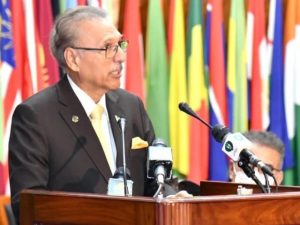The government wants the president to defuse the ongoing energy dispute with Punjab and K-P.
It is planned to request that the President put pressure on the provinces to carry out the national plan.

ISLAMABAD: The coalition government has chosen to speak with President Arif Alvi in an effort to persuade the Punjab and Khyber-Pakhtunkhwa governments to carry out the national energy conservation plan that the federal cabinet adopted last month.
In the plan, the federal government outlined a number of initiatives targeted at saving energy and lowering the nation’s import costs. The Pakistan Tehreek-e-Insaf (PTI)-led governments in Punjab and K-P, however, had resisted the measures.
A question of whether the K-P and the Punjab administrations will be contacted was brought up during a meeting in the cabinet. The ministers were advised that the president would be asked to use his position to persuade the two provinces to join, and that the chief secretaries of those provinces would also be consulted.
On October 11, 2022, the Power Division submitted numerous energy conservation measures to the federal cabinet. After careful study, the cabinet established a committee to refine these actions. This committee met five times to discover, assess, and plan feasible energy efficiency and conservation actions.
The federal cabinet was then given a thorough plan and implementation strategy on December 20, 2022. The cabinet instructed the Committee, headed by Defense Minister Khawaja Asif, to continue its consultation with the provinces and inform them of the energy conservation initiatives, their impact, and the actions required by the provinces because some measures required the active support of the provincial governments.
According to sources, both the provincial governments of Sindh and Balochistan were extremely cooperative during consultations but requested time to meet with traders, owners of hotels and wedding venues, and other business owners who would likely be impacted by the proposed energy conservation measures.
The Punjab and K-P provinces, however, expressed opposition to putting the suggested steps into action. The administration emphasised the urgent need to implement energy conservation measures, stressing that doing so was no longer an option but an inevitable necessity because the economy could not support the high cost of fuel imports.
A cabinet member stated that a decision had not yet been made about the idea to designate Friday as a work-from-home day or the option to have 20% of the workforce work from home on a rotating basis throughout the week.
The option of working from home, according to a competing viewpoint, is inconsistent with our workplace culture and would impair government agencies’ effectiveness. The cabinet members recommended that all departments and divisions be given instructions to reduce their electricity costs by 30%.
A cabinet member emphasised how urban centres’ characteristics differed from those of rural areas, where it would be considerably simpler to implement the early closure of firms. He emphasised the significance of reaching an agreement with all parties involved in order to effectively implement the energy conservation measures.
Other recommendations made by the cabinet members included converting public schools and metro stations to solar power, offering online courses at public schools to cut down on electricity use, and taking advantage of Sindh and Balochistan’s abundant wind resources.
Some cabinet members believed that online classes were impractical because they would disadvantage pupils in isolated and rural locations without access to electricity and the internet. The work-from-home proposal was also temporarily postponed by the cabinet.
When asked how much money would be saved if employees worked from home on Friday, the answer was $271 million, consisting of $16 million in energy costs and $255 million in fuel savings. On this day, the Power Division was also instructed to address the cabinet with a presentation on wind energy initiatives.










































